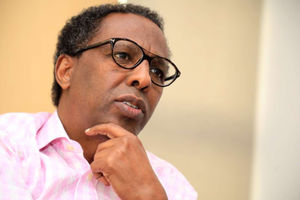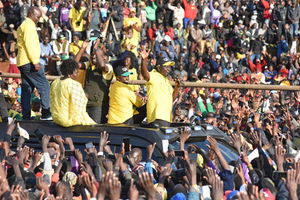
A shell of a lorry burnt by suspected Al-Shabaab militants in Mandera South in a past attack. There’s no way Kenya can thwart the deadly – sometimes existential – threats posed by terror groups like Al Shabaab without citizen cooperation
Today, we live in an age of discontent because most people have too much information, but very little knowledge. Wherever you turn, the so-called Internet of Things is shouting at you. Every message and messenger claims to know the truth.
A simpleton sitting in a remote village in the Sahara or the wilds of Alaska is suddenly an “expert.” Why? That’s because we are swimming in seas of un-interrogated and undigested mountains of filth in the name of information. But in these “mountains of filth” are nuggets of wisdom, explosive truths that are hidden in plain sight.
The capacity and tools to sift through the filth is what separates the lettered from the unlettered. This is true of private citizens as it is from states, non-governmental organisations and corporations.
It is a cliché that information is power. But that’s a bad and terrible cliché. It’s not information that’s power, but knowledge. People and states that are knowledgeable dominate those who aren’t. That’s because the foundation of power is knowledge.
All advanced civilisations achieved their dominance through knowledge – from the Ancient Egyptians and Romans to modern day Americans, Chinese, and Russians. Those with less knowledge – for any number of reasons – live at the mercy of those with it. However, there is a sense that the democratisation of information – and therefore knowledge – can empower the proverbial little guy.
Smaller and less endowed states are now able to mine information for knowledge and reduce the gap between themselves and the “knowledge superpowers.”
What’s my point? For decades, states used to collect intelligence the old fashioned way – by putting boots on the ground. The image of the spy complete with a hat and raincoat with the collar turned up came to symbolise the quintessential spook.
Gadgets, often seen in James Bond movies, were the fares of the trade. Alluring women, many of them intoxicatingly seductive, would often lead many a man to give up top secrets before dispatching him to his Maker. Some capitals became legendary for spy games – Washington D.C., Berlin, Moscow, Vienna – became catchphrases for “spy gates.”
While breathing live spies are still key to collection of intelligence, they are slowly giving way to Artificial Intelligence, drones, and hi-tech software capable of penetrating deeply and widely everywhere, including the “deep” and “dark” web.
Still, human analysts and thinkers are indispensable for it’s they who must make close calls between life and death. We haven’t gotten to the point where technology can be 100 per cent autonomously reliable. This makes it necessary for national intelligence organs to collaborate with like-minded organisations across regions to thwart actual threats such as terrorism, money laundering, trafficking in humans , attacks to critical national infrastructure, organ harvesting, and enslavement.
Today, because national grids are run through technology, enemy states, or criminal actors can pounce in cyberspace and plunge a country into darkness, steal critical defense information, or citizen data, take countries hostage for ransom, or poison water sources.
Democracy today cannot be safeguarded from malevolent forces without new-age spy craft. In other words, statecraft itself depends today on a nation’s ability to collect and digest massive tonnes of information into actionable knowledge and intelligence. That will require cooperation, especially in regional blocs and like-minded states.
Local press recently carried reports of one such effort led by Kenya’s National Intelligence Service (NIS) to harness capabilities within the region to thwart threats to critical state and national functions. It was dubbed Mashariki Cooperation Conference and brought together 17 states in the region. The fact that the meeting was reported publicly raised eyebrows in some quarters but praise in others.
We must do away with the old way of “doing things.” Spooks of a bygone era used to meet in male-dominated smoke-filled rooms to plan nefarious activities and unspeakable evils away from the public eye. However, today modern states must rely on citizens for their legitimacy and security.
For example, there’s no way Kenya can thwart the deadly – sometimes existential – threats posed by terror groups like Al Shabaab without citizen cooperation in the country’s north and coastal areas. Terror groups can make such “hotspots” no-go zones and reduce the remit of the state if citizens do not feel the state is trustworthy. That’s why intelligence services need to move out of dark cocoons and into the sunlight so that they can be embraced by the public.
States must jealously guard some secrets. Israel, for example, has never acknowledged it’s a nuclear state. I get this. But Kenya’s Constitution requires transparency and accountability of state institutions.
That’s why it was a step in the right direction for Kenya’s NIS to open up the Mashariki Cooperation Conference in a limited way to the press and include “outsiders” such as civil society, independent experts, and academics to address it. Such transparency will go a long way in creating a more capable, professional, and legitimate agency.
- Makau Mutua is SUNY Distinguished Professor and Margaret W. Wong Professor at Buffalo Law School, The State University of New York. @makaumutua.










